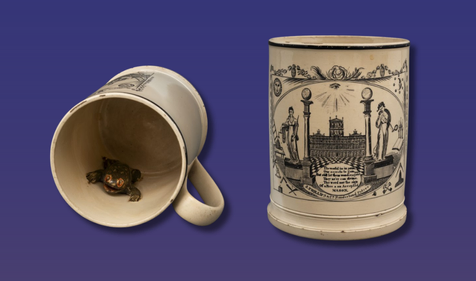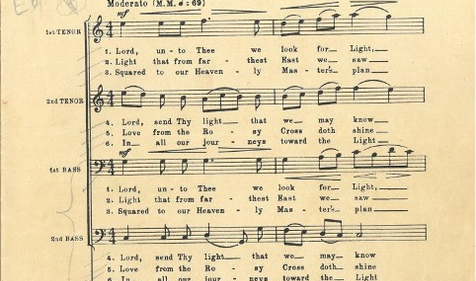John Lewis was many things. He was a Freemason, a congressman whose career spanned several decades, and a pivotal figure within the civil rights movement.
"You are a light. You are the light. Never let anyone — any person or any force — dampen, dim or diminish your light … Release the need to hate, to harbor division, and the enticement of revenge. Release all bitterness. Hold only love, only peace in your heart, knowing that the battle of good to overcome evil is already won." – John Lewis; Across That Bridge: A Vision for Change and the Future of America
John Lewis was many things. He was a Freemason, a congressman whose career spanned several decades, and a pivotal figure within the civil rights movement. Brother Lewis fought to change the United States for the better, to ensure all its citizens could safely live a life of dignity and prosperity. His life was dedicated to the service to others and through the years he inspired countless others to commit themselves to relief and justice, truth and love. For his many accomplishments, we are grateful and filled with pride that we may call him "Brother."
John Lewis' Early Life
Born John Robert Lewis on February 21, 1940, in Troy, Alabama, he was the third of ten children of sharecroppers Willie Mae (née Carter) and Eddie Lewis. Growing up in a state deeply divided along racial lines, Lewis witnessed firsthand the injustices of racism and segregation from a young age. He first heard Mart Luther King Jr. speak on the radio when he was 15 and quickly started following King's protests, such as the famous Montgomery bus boycott that same year.
In 1957, Lewis left Alabama for Nashville, Tennessee, to attend the American Baptist Theological Seminary and Fisk University, where he earned a B.A. in religion and philosophy. Already inspired by the courageous and peaceful acts of protest by Dr. King and Rosa Parks, John became committed to the civil rights struggle.
John Lewis and the Civil Rights Movement
While studying in Nashville, Lewis helped organize sit-ins at segregated lunch counters and other public places. These nonviolent protests were ultimately responsible for the desegregation of lunch counters in the city. He then encouraged others to engage in "good trouble, necessary trouble" to implement change. He would become famous for this phrase and repeat it throughout his life.
Lewis became one of the original Freedom Riders in 1961, taking a central role in one of the civil rights movement's most pivotal efforts. These protests, which challenged the segregation of interstate bus lines, gained national attention as the protesters were routinely beaten and arrested by law enforcement. In 1963, Bro. Lewis was central to the momentous March on Washington, known for gathering over 250,000 people at the Lincoln Memorial and Dr. King's famous "I Have a Dream" speech.
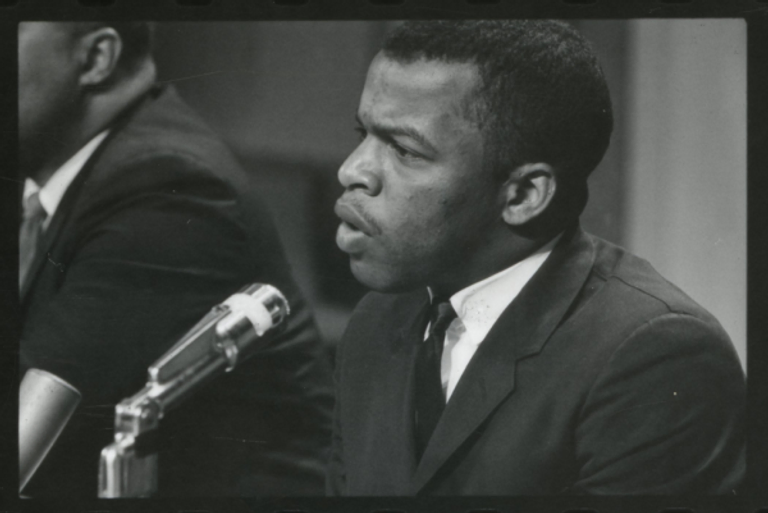
Two years later, he would be at the heart of another critical moment in the civil rights movement, the Selma to Montgomery marches. These marches saw protesters walk peacefully along the 54-mile stretch of highway from Selma, Alabama, to the state capital of Montgomery to demonstrate the desire of black citizens to exercise their constitutional right to vote. During the first march on March 7, unarmed, peaceful protesters were met and attacked by state troopers and possemen, a date that would become known as "Bloody Sunday."
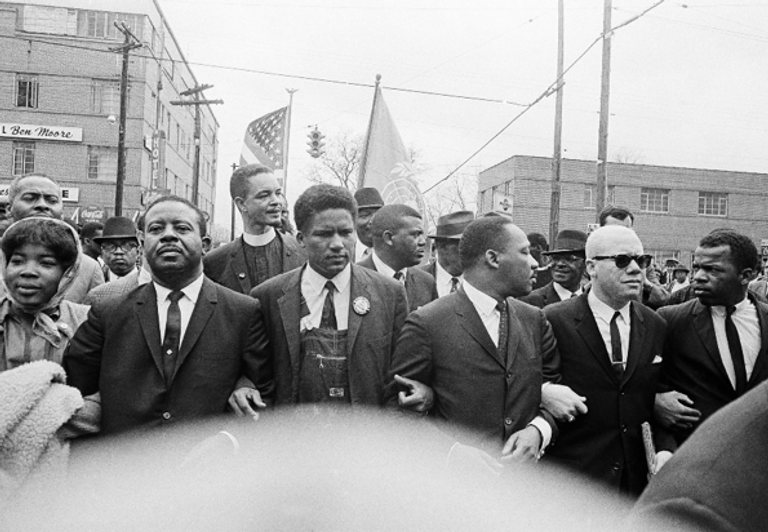
Although law enforcement's response was a travesty, the marches highlighted the depth of racial injustice, helping to move forward the Voting Rights Act that same year. This law prohibits racial discrimination in voting, a landmark federal legislation of the civil rights movement. Through his efforts in organizing these historic protests, John Lewis was instrumental in bringing about significant change for the black community in the United States.
Onto the Capital
Over the next twenty years, John carved a career out of serving others. He spent many years as the director of The Voter Education Project, through which he helped register over four million new voters. In 1977, after unsuccessfully running to fill a seat in the House of Representatives, President Carter appointed Lewis to lead ACTION. This federal agency included the Peace Corps and Volunteers in Service to America (VISTA).
In 1981, John began an almost 40-year tenure in elected office when he won a seat on the Atlanta city council with 69 percent of the vote. After serving the city for five years, he was elected to serve Georgia's 5th district in the U.S. House of Representatives. Over the next three decades, Lewis was reelected 16 times, only dropping below 70 percent of the vote once in that span.
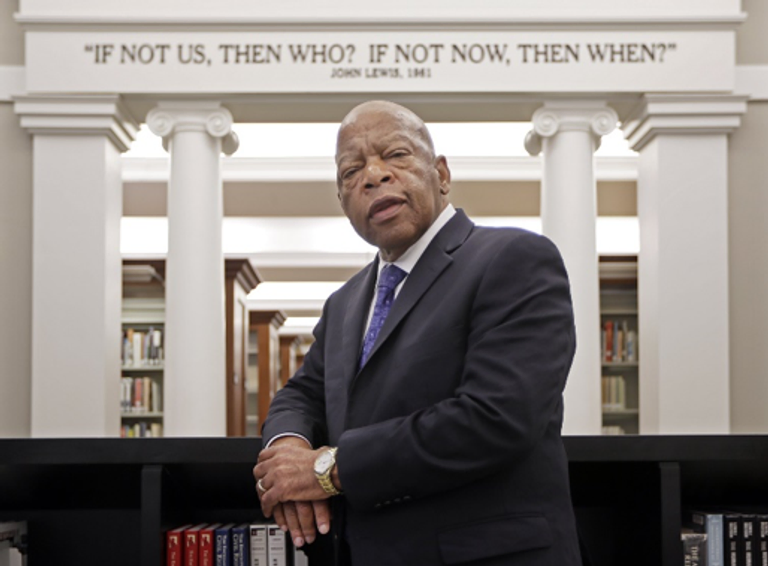
Of course, Lewis's political career closely reflected his values as a peaceful civil rights activist. As a staunch liberal, an advocate for gay rights and national health care, The Atlanta Journal-Constitution wrote that he was "the only former major civil rights leader who extended his fight for human rights and racial reconciliation to the halls of Congress." His vote was always guided by his unshakable morality, leading him to become known as "the conscience of Congress."
For his many accomplishments and years of service to the United States people, Congressman Lewis received numerous awards, including the Presidential Medal of Freedom, the NAACP's Spingarn Medal, and the sole John F. Kennedy "Profile in Courage Award" for Lifetime Achievement.
The Heart of a Mason
Given Brother Lewis's ardent dedication to promoting justice and equality, it is no surprise that the tenets and teachings of Freemasonry appealed to him. In 1999, Lewis was made a Prince Hall Mason at H. R. Butler Lodge No. 23 in Atlanta by Grand Master Benjamin Barksdale of the Most Worshipful Prince Hall Grand Lodge F&AM of Georgia. Twelve years later, Brother Lewis received the honorary 33° at the United Supreme Council Session in Atlanta. He was a member of the Atlanta Consistory No. 24-A, Orient of Georgia (PHA). Additionally, Ill. Brother Lewis was a Shriner in the Prince Hall-associated Khedive Temple No. 16, and later in Mecca Temple No. 10, in the Ancient Egyptian Arabic Order Nobles of the Mystic Shrine.
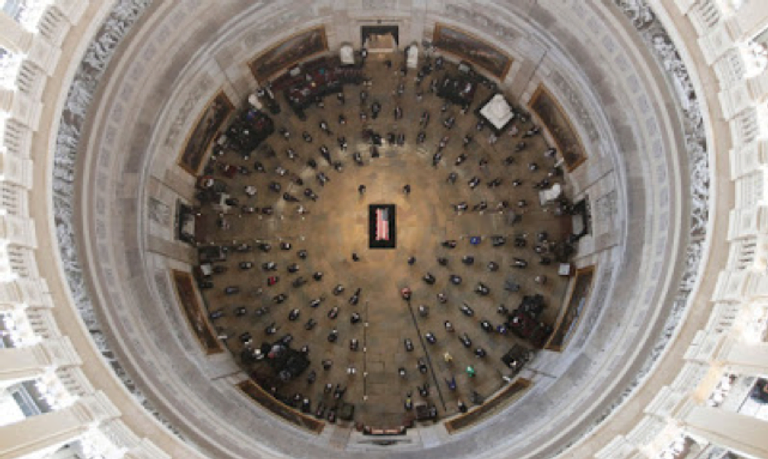
Brother Lewis passed to the Celestial Lodge in July 2020 after a battle with pancreatic cancer. Upon his death, he became the first African American lawmaker to lie in state in the rotunda of the U.S. capitol. His death moved the entire country, and at his funeral, three former presidents were in attendance. He was also honored with a ceremony by the Prince Hall Free and Accepted Masons of Georgia, a moment many Masons across the country and we cherished. Undoubtedly, Brother John Lewis will inspire Americans for generations to come to pursue a life of peace and light.
Related Stories
Discover additional Scottish Rite blogs and news on this topic.

